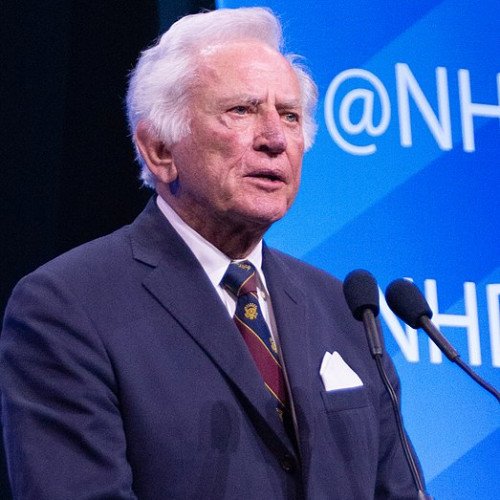Barry Goldwater VS Gary Hart

Barry Goldwater
Barry Morris Goldwater (January 2, 1909 – May 29, 1998) was an American politician, businessman, and author who was a five-term Senator from Arizona (1953–1965, 1969–1987) and the Republican Party nominee for president of the United States in 1964. Despite his loss of the 1964 presidential election in a landslide, Goldwater is the politician most often credited with having sparked the resurgence of the American conservative political movement in the 1960s. He also had a substantial impact on the libertarian movement.Goldwater rejected the legacy of the New Deal and, along with the conservative coalition, fought against the New Deal coalition. A member of the NAACP and active supporter of desegregation in Phoenix, Goldwater voted in favor of the Civil Rights Act of 1957 and the 24th Amendment to the U.S. Constitution, but opposed the Civil Rights Act of 1964, believing it to be an overreach by the federal government—a decision that considerably anguished him. In 1964, Goldwater mobilized a large conservative constituency to win the hard-fought Republican presidential primaries. Although raised as an Episcopalian, Goldwater was the first candidate of ethnically Jewish heritage to be nominated for President by a major American party (his father was Jewish). Goldwater's platform ultimately failed to gain the support of the electorate and he lost the 1964 presidential election to incumbent Democrat Lyndon B. Johnson by one of the largest margins in history. Goldwater returned to the Senate in 1969 and specialized in defense and foreign policy. As an elder statesman of the party, Goldwater successfully urged President Richard Nixon to resign in 1974 when evidence of a cover-up in the Watergate scandal became overwhelming and impeachment was imminent. Goldwater narrowly won re-election in 1980 for what would be his final and most influential term in the senate. In 1986, Goldwater oversaw passage of the Goldwater–Nichols Act, arguably his most significant legislative achievement, which strengthened civilian authority in the Department of Defense. The following year, he retired from the Senate and was succeeded by John McCain, who praised his predecessor as the man who "transformed the Republican Party from an Eastern elitist organization to the breeding ground for the election of Ronald Reagan". Goldwater strongly supported the 1980 presidential campaign of Reagan, who had become the standard-bearer of the conservative movement after his "A Time for Choosing" speech. Reagan reflected many of the principles of Goldwater's earlier run in his campaign. The Washington Post columnist George Will took note of this, writing: "We [...] who voted for him in 1964 believe he won, it just took 16 years to count the votes". Goldwater's views grew increasingly libertarian as he neared the end of his career. After leaving the Senate, Goldwater's views cemented as libertarian. He criticized the "moneymaking ventures by fellows like Pat Robertson and others [in the Republican Party] who are trying to... make a religious organization out of it." He lobbied for homosexuals to be able to serve openly in the military, opposed the Clinton administration's plan for health care reform, supported abortion rights, and the legalization of medicinal marijuana.
Statistics for this Xoptio

Gary Hart
Gary Warren Hart (né Hartpence; born November 28, 1936) is an American politician, diplomat, and lawyer. He was the front-runner for the 1988 Democratic presidential nomination until he dropped out amid revelations of extramarital affairs. He represented Colorado in the United States Senate from 1975 to 1987. Born in Ottawa, Kansas, he pursued a legal career in Denver, Colorado, after graduating from Yale Law School. He managed Senator George McGovern's successful campaign for the 1972 Democratic presidential nomination and McGovern's unsuccessful general election campaign against President Richard Nixon. Hart defeated incumbent Republican Senator Peter Dominick in Colorado's 1974 Senate election. In the Senate, he served on the Church Committee and led the Senate investigation regarding the Three Mile Island accident. After narrowly winning re-election in 1980, he sponsored the Semiconductor Chip Protection Act of 1984, becoming known as an "Atari Democrat". Hart sought the Democratic presidential nomination in 1984, narrowly losing the race to former Vice President Walter Mondale. Hart declined to seek re-election to the Senate in 1986 and sought the Democratic presidential nomination in 1988. He was widely viewed as the front-runner until reports surfaced of an extramarital affair, and Hart withdrew from the race in May 1987. He re-entered the race in December 1987 but withdrew from the race again after faring poorly in the early primaries. Hart returned to private practice after the 1988 election and served in a variety of public roles. He co-chaired the Hart-Rudman Task Force on Homeland Security, served on the Homeland Security Advisory Council, and was the United States Special Envoy for Northern Ireland. He earned a doctorate in politics from the University of Oxford and has written for outlets such as The Huffington Post. He has also written several books, including a biography of President James Monroe. Hart has been married to Lee (Ludwig) since 1958 and has two children.